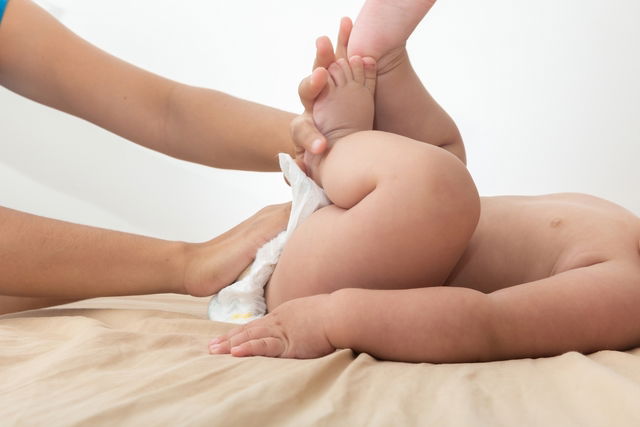Baby eczema occurs when the baby's skin comes in contact with irritating substances, like urine, saliva or some creams, that cause red, flaky, itchy and painful skin.
Although baby eczema is not a serious condition and is easily treated, it should be avoided when possible. Skin irritation can lead to wounds that may become infected, especially when located in the diaper area.
It is important to keep the baby's skin clean and dry by considering measures like changing diapers when they are soiled, wiping off any excess drool and using skin products that are appropriate for a baby's skin.

Main symptoms
The signs and symptoms of baby eczema are:
- Red rashes that start to peel and flake
- Small bumps or blisters on the skin that itch
- More frequent crying and irritation from the baby
Normally, these skin changes occur within skin folds or in areas that are in constant friction with clothing or the diaper, like the neck, genital area or wrists.
Possible causes
Baby eczema can be caused by:
- Frequent contact with urine or stool
- Creams or ointments
- Perfumes
- Soaps
- Fabrics
- Jewelry
- Frequent contact with drool
If you suspect your baby may have eczema, it is important to contact a pediatrician for assessment, especially if you are unsure of the underlying cause.
Treatment options
In most cases, baby eczema resolves on its own after 2 to 4 weeks. To relieve discomfort faster and prevent wound formation, it is important to keep affected areas of the skin clean and dry. Moist skin with rashes can worsen irritation. It is also important to apply a baby-appropriate moisturizing cream or a zinc ointment after bathing to affected skin. This can help to protect the skin and speed-up healing.
How to prevent baby eczema
The best way to prevent baby eczema is to ensure the skin remains clean and dry. You should also try to manage any possible irritating substances from coming in contact with the baby's skin.
Some additional prevention measures include:
- Wipe off any excess drool and remove wet clothing
- Change diapers when soiled with urine or stool
- Remove tags from clothing
- Opt for cotton-based fabrics and avoid synthetic materials
- Avoid any metal or plastic accessories and opt for rubber or silicone
- Apply zinc ointments to the genitals to prevent moisture in the area
- Avoid using creams and other products that are not made for use in babies
If you are aware of any possible allergies that the baby already has, it is important to avoid contact with it. You should read clothing and toy labels carefully to ensure these materials are not found in its composition.
These measures can also be considered when the eczema is already present, and can be used to speed-up recovery.
